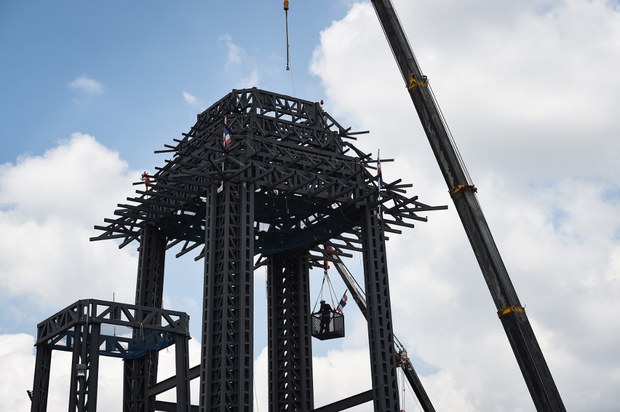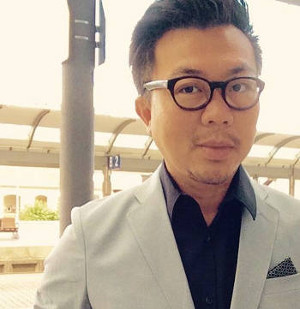Exiled Thai Academic Holds Out Hope for Democracy in Thailand – Eventually
2017.05.19
Washington
 A worker holding a Thai flag approaches the top of the late Thai King Bhumibol Adulyadej’s funeral pyre in Bangkok, March 31, 2017.
A worker holding a Thai flag approaches the top of the late Thai King Bhumibol Adulyadej’s funeral pyre in Bangkok, March 31, 2017.
Thailand has banned people in the country from contacting, following or otherwise engaging online with three government critics overseas.
One of them is Pavin Chachavalpongpun, a professor of politics and international relations at Kyoto University in Japan.
The ban has made him better known among Thais than he was previously, Pavin told BenarNews in an interview.
“Strangely, and against the warning from the Thai state, I have more followers since the ban was launched,” he said.
The other two are Somsak Jeamteerasakul, a former lecturer at Thammasat University now living in France; and Briton Andrew MacGregor Marshall, a former Reuters reporter, according to Thailand’s Ministry of Digital Economy and Society.
Pavin studies and writes about key institutions in Thailand including the monarchy and the military, which came to power in a coup three years ago “primarily to manage the royal succession,” he said.
That transition is now firmly under way since long-reigning King Bhumibol Adulyadej died in October 2016 and was succeeded by his son, King Maha Vajiralongkorn.
Pavin says he “doesn’t care” about a promised return to democracy in 2018 because, thanks to a new constitution, “we can expect that the new government will either be weak, of coalition, or be under the domination of the military.”
Pavin (pictured) has paid a high price for the ability to speak freely about his country.

After the coup in May 2014, authorities twice summoned Pavin to discuss his opinions. As he did not comply, the junta issued a warrant for his arrest and revoked his passport.
But he holds out hope that Thailand will follow some of its neighbors by establishing democracy within the next two decades, reflecting changes in the region and within Thai society itself.
BN: You are one of three individuals that people in Thailand are banned from contacting online.
What was your reaction to this move and how has it impacted you?
(courtesy of Pavin Chachavalpongpun)
Pavin: I am not surprised to learn that I have been among those being banned online by the Thai state, given that I have been critical of the military and monarchy. I have not reacted in any way in particular, but just continue my usual activities online. If anything, I am more open and direct than before. As a result, strangely, and against the warning from the Thai state, I have more followers since the ban was launched. More than 3,000 people have followed me on top of my regular followers. If there was an impact on me, the ban helped me become more well-known among Thais.
BN: We have reached the third year anniversary of the coup that brought the junta to power. What are positive and negative aspects of this chapter in Thailand’s political history?
Pavin: There is nothing positive coming out of the military's intervention in politics. Optimists would say that the coup renders good lessons for Thais and politicians alike… For me, this is a setback of Thai democracy. The military staged a coup primarily to manage the royal succession. On top of that, the military wanted to ensure that enemies of the elites are eliminated, in this case, the Shinawatra family. In the process, they have rewritten the constitution to allow the military to entrench its influence in politics, weakening civilian governments in the future. Also in the process, civil liberty has been taken away. Thais can no longer express their political views freely. The media has to practice self-censorship. The monarchy has wanted to maintain its political dominance by exploiting the Lese-Majeste law to undermine its critics. This explains why cases of Lese-Majeste skyrocketed over the year.
BN: It’s been 25 years since bloody May, when mostly middle-class protesters rose up to demand the resignation of an unelected prime minister. What is different today? Why is the middle class of Bangkok not protesting military rule as it did then?
Pavin: We have to understand that the Thai middle class has never been a reliable partner of democracy… They will support democracy if the latter gives them benefits. ... When they are under threat or their government can no longer guarantee their advantages, they will turn against democracy and support military rule. This has been the case of Thailand, and is not uncommon in Southeast Asia, I must say. From 1992 until today, little has changed. The Thai middle class is still searching for their political benefits at the expense of their real promotion of democracy.
BN: When do you think elections will be held? Will Thailand return to a more limited form of democracy, in your view?
Pavin: Frankly, I don't know. And frankly, I don't care. … I don't know because we cannot rely on the military government. The junta will not allow the election until it can be certain that its power arrangement has been successful. As for why I don't care, this is simply because the junta-written constitution will not promise real democracy. [Given] the content of the new constitution, we can expect that the new government will either be weak, of coalition, or be under the domination of the military. So yes, Thai democracy in the new government will be limited.
BN: Much has been written about curbs on freedom of speech under the current government. What about academic freedom?
Pavin: Little or none. Within Thailand, my academic friends have worked under extreme pressure. They are not allowed to freely express themselves. They are not allowed to hold any conferences deemed a threat to the junta. Anyone vocal about the junta, the monarchy will have their attitude adjusted. Outside Thailand, as in my case, I have more freedom to express myself, but the price is high. I cannot return home. They also charge me with Lese-Majeste.
BN: Where do you hope to see Thailand in 20 years?
Pavin: Despite what I said, I hope democracy will eventually return to my country. I believe that non-democratic forces will be defeated by the will of the people. The international environment has changed so much with the opening up of countries like Indonesia and Myanmar. Thailand will never be able to run away from it. … Thailand is not the same as in the past. Based on this, I hope that the military and the monarchy will come to terms with the changes.







